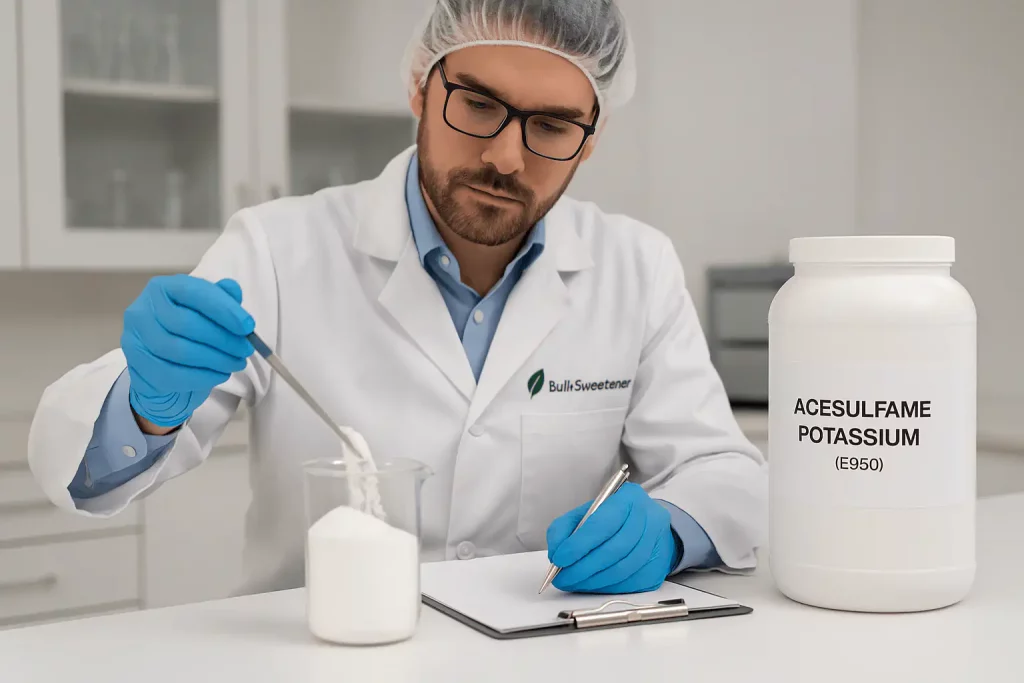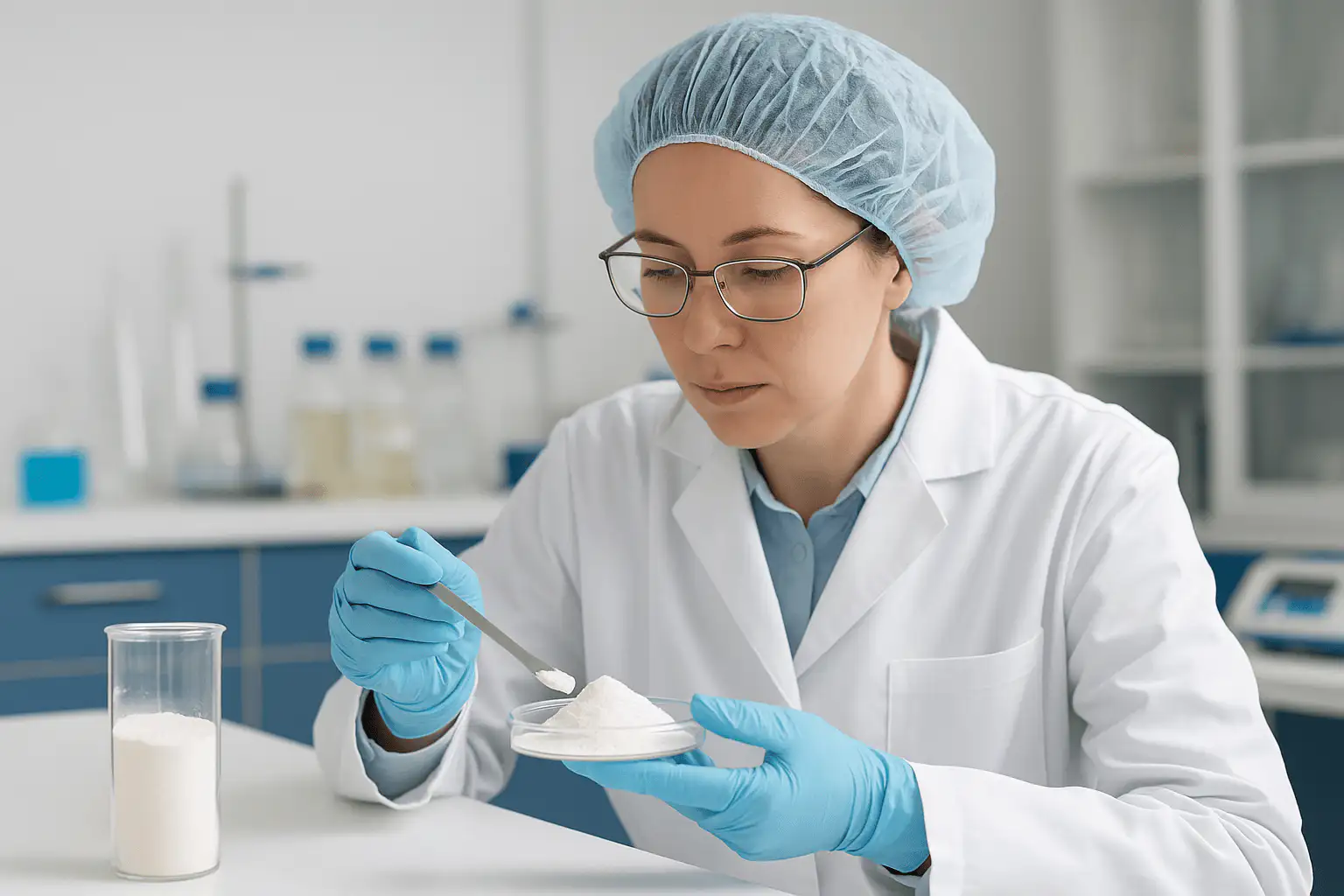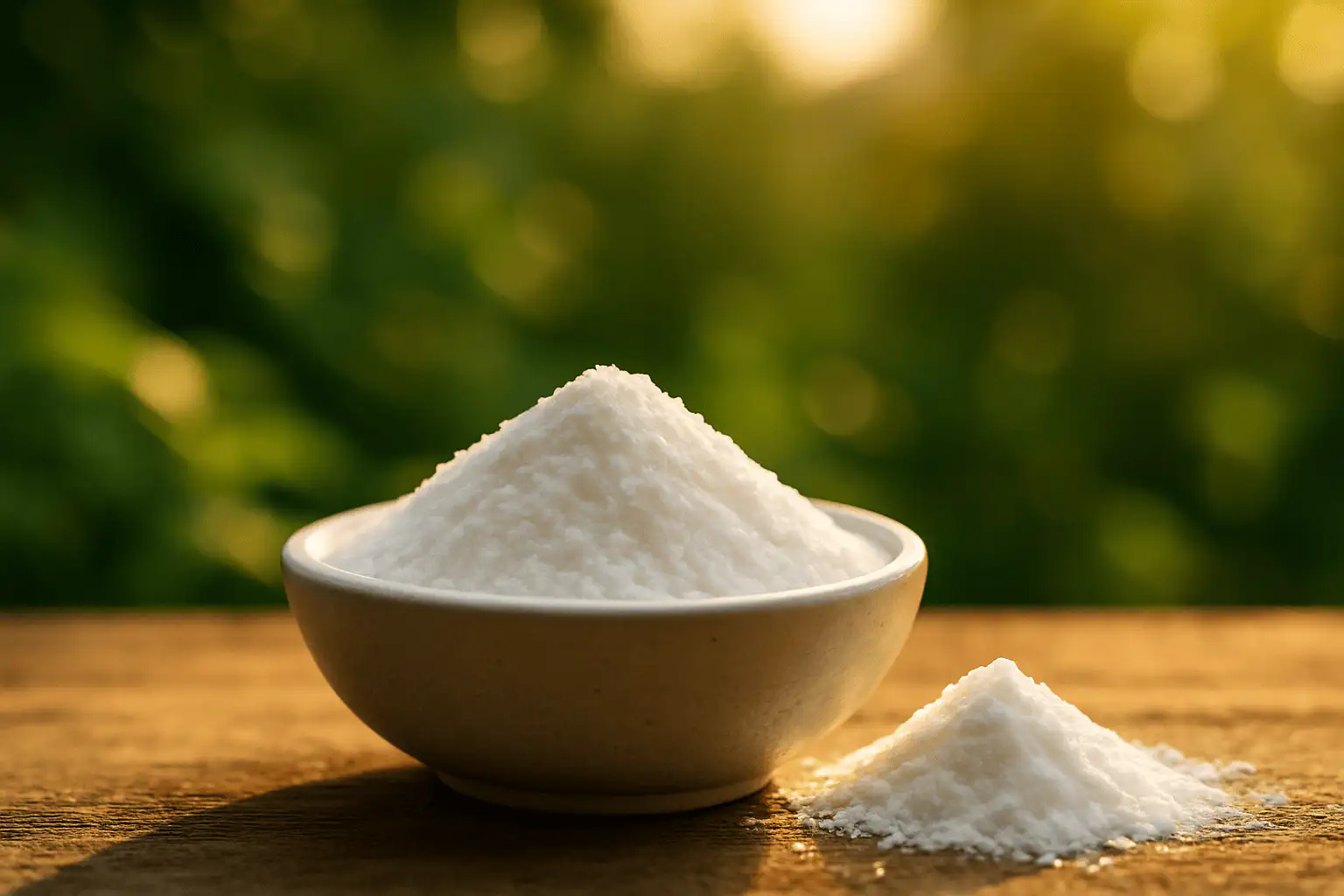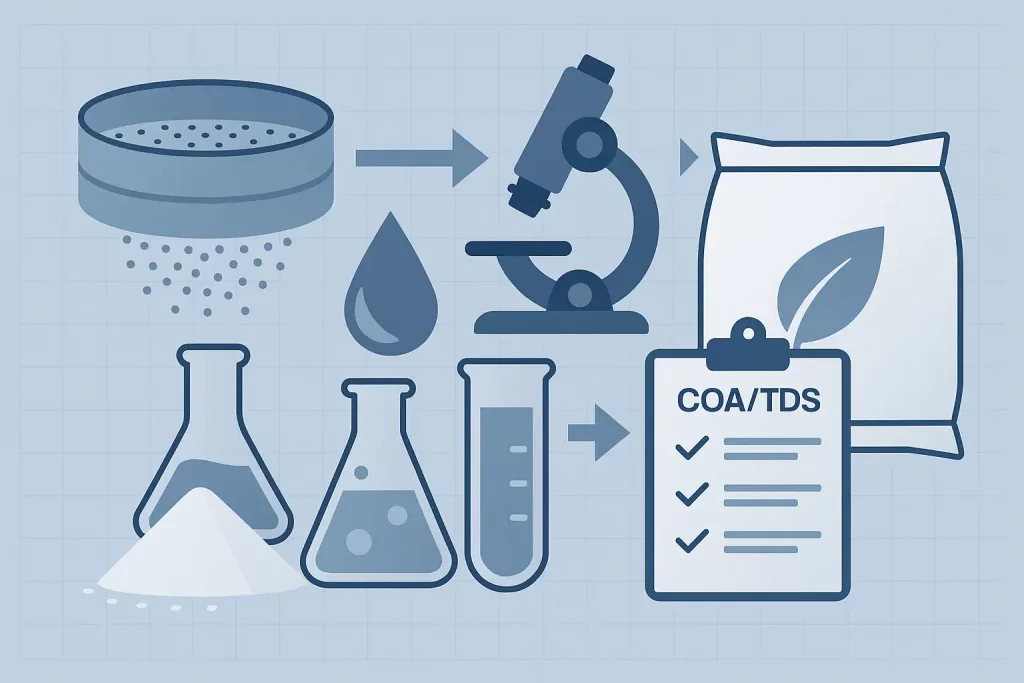Ace-K (acesulfame potassium) in bulk for industry: consistent quality and reliable supply
If you’re sourcing ace k (also listed as acesulfame potassium, acesulfame k or ace k ingredient) for large-scale production, we deliver bulk Ace-K with tight PSD, low moisture and clean dissolution. Choose grades for beverages, bakery and confectionery, or design ace k and sucralose blends for sugar-like profiles. Request sucralose + acesulfame k co-sweetening guidance, COA/TDS per lot, and freight options for EU/UK/LATAM.


Formulation Tech Support

Competitive Prices

Natural Taste

Full batch traceability
The risks of buying ace k without standards
- Irregular dissolution in cold-fill beverages
- Off-notes in acesulfame k from impurities
- PSD drift → inconsistent sweetness release
We qualify sources, control particle size via calibrated sieving/milling, and cap moisture to spec. Each acesulfame potassium lot is QC-checked (assay, pH, moisture, heavy metals, micro) and released with COA/TDS. Result: predictable sweetness, clean dissolution and fewer reworks.

Key Technical Specifications — Bulk Acesulfame K (E950)
| Category | Specification | Details |
|---|---|---|
| Chemistry | Assay (acesulfame K) | Typically ≥ 99.0% (on dry basis) :contentReference[oaicite:1]{index=1} |
| Relative sweetness (vs sucrose) | ≈ 200× sweetness of sucrose :contentReference[oaicite:2]{index=2} | |
| pH (1 % aqueous solution) | ≈ 6.5 – 7.5 :contentReference[oaicite:3]{index=3} | |
| Chemical ID | CAS 55589-62-3 · E950 · potassium salt of 6-methyl-1,2,3-oxathiazin-4(3H)-one 2,2-dioxide :contentReference[oaicite:4]{index=4} | |
| Physical | Loss on drying (moisture) | Typically ≤ 1.5-2.0% (depending on grade) [typical for crystalline powders] * |
| Residue on ignition (ash) | Typically ≤ 0.5-0.7% (depending on grade) * | |
| Solubility in water (20 °C) | ≈ 270 g/L at 20 °C (≈27 % w/v) :contentReference[oaicite:5]{index=5} | |
| Stability | Thermal | Melting point > 225 °C; stable under typical food processing conditions (heat, baking) :contentReference[oaicite:6]{index=6} |
| pH range | Stable across broad pH range (approx. pH 3-8) under usual conditions * | |
| Hygroscopicity | Low to moderate; recommended storage: cool and dry (< 60% RH) * | |
| Quality | Allergens | None expected (does not contain gluten, soy, nuts, dairy) * |
| GMO | Non-GMO options available * | |
| Heavy metals | Complies with food-grade limits (e.g., Pb < 1 mg/kg typical) * | |
| Origin / process | Produced via chemical synthesis from suitable precursors; purification to food-grade standard * | |
| Documents | COA, TDS, MSDS available on request | |
* Specifications marked with “*” are typical industry targets for food-grade acesulfame K and may vary by manufacturing batch or supplier. Always refer to the specific certificate of analysis (COA) for each lot.
Key Technical Specifications — Bulk Acesulfame K (E950)
| Category | Specification | Details |
|---|---|---|
| Chemistry | Assay (acesulfame K) | Typically ≥ 99.0% (on dry basis) :contentReference[oaicite:1]{index=1} |
| Relative sweetness (vs sucrose) | ≈ 200× sweetness of sucrose :contentReference[oaicite:2]{index=2} | |
| pH (1 % aqueous solution) | ≈ 6.5 – 7.5 :contentReference[oaicite:3]{index=3} | |
| Chemical ID | CAS 55589-62-3 · E950 · potassium salt of 6-methyl-1,2,3-oxathiazin-4(3H)-one 2,2-dioxide :contentReference[oaicite:4]{index=4} | |
| Physical | Loss on drying (moisture) | Typically ≤ 1.5-2.0% (depending on grade) [typical for crystalline powders] * |
| Residue on ignition (ash) | Typically ≤ 0.5-0.7% (depending on grade) * | |
| Solubility in water (20 °C) | ≈ 270 g/L at 20 °C (≈27 % w/v) :contentReference[oaicite:5]{index=5} | |
| Stability | Thermal | Melting point > 225 °C; stable under typical food processing conditions (heat, baking) :contentReference[oaicite:6]{index=6} |
| pH range | Stable across broad pH range (approx. pH 3-8) under usual conditions * | |
| Hygroscopicity | Low to moderate; recommended storage: cool and dry (< 60% RH) * | |
| Quality | Allergens | None expected (does not contain gluten, soy, nuts, dairy) * |
| GMO | Non-GMO options available * | |
| Heavy metals | Complies with food-grade limits (e.g., Pb < 1 mg/kg typical) * | |
| Origin / process | Produced via chemical synthesis from suitable precursors; purification to food-grade standard * | |
| Documents | COA, TDS, MSDS available on request | |
* Specifications marked with “*” are typical industry targets for food-grade acesulfame K and may vary by manufacturing batch or supplier. Always refer to the specific certificate of analysis (COA) for each lot.
Client testimonials and reviews
Bara Ezquerra
At Bara Ezquerra we work with Bulksweetener for our acesulfame potassium (Ace-K), and the quality is excellent: clean Ace-K sweetness, no off-notes, and very consistent. We pack it in sticks for our HORECA clients and they’re very happy; they reorder and value the stable PSD for fast dissolution. We also use Ace-K and sucralose blends to match sugar timing in hot and cold drinks—easy to dose and compliant docs for audits.
Cacao Delta
After testing several options, Cacao Delta chose Bulksweetener’s Ace-K ingredient with a fine mesh. It delivers ~180–200× sweetness that preserves cocoa notes and withstands tempering and baking. No recrystallization issues and no lingering aftertaste. In fillings and coatings, acesulfame K and sucralose give us a balanced, sugar-like profile at low usage levels, helping standardize batches and reduce rework across lines.
Acasyna
For our jams, Bulksweetener’s acesulfame K sweetener works beautifully: predictable assay, tight moisture, and uniform particle size. It sweetens without masking the fruit and keeps a consistent texture after months in storage—no syneresis and clean taste. When we need more roundness, the acesulfame K + sucralose synergy hits our target Brix with minimal calories and repeatable results from lot to lot.
Oroyes
As a food distributor, Oroyes brings Bulksweetener’s acesulfame potassium (Ace-K) and sucralose to retail and foodservice. The range moves quickly because it’s reliable: clear documentation (COA/TDS), Ace-K that dissolves fast, and consistent sensory. Product quality is steady, so our customers reorder regularly. For tabletop and RTD, the Ace-K and sucralose blends provide strong sweetness with low cost-in-use and simple inventory.
Frequently Asked Questions — Bulk Acesulfame k
What is Ace-K (acesulfame potassium) and how sweet is it?
Ace-K (also called acesulfame k, ace potassium) is a high-intensity sweetener about ~180–200× sweeter than sugar by weight. It’s widely used in ace k sweetener bulk formulations for beverages, confectionery and bakery.
Is Ace-K safe and how is it regulated?
Ace-K is approved by major authorities (e.g., FDA/EFSA/JECFA) within established limits. The ADI is commonly cited at 15 mg/kg body weight/day. Always follow local regulations and good manufacturing practices.
Does Ace-K impact gut health?
Current evidence indicates Ace-K is not metabolized like sugar and is used at very low levels. Research continues; formulators evaluate finished products holistically (matrix, dose, and co-sweeteners).
What’s the benefit of Ace-K with sucralose (or aspartame/stevia)?
Acesulfame k and sucralose show synergy, delivering a more sugar-like temporal profile at lower combined dosages. Many brands pair ace k and sucralose in beverages and tabletop.
How does particle size (PSD) affect processing in ace k ingredient lines?
Finer mesh (e.g., 120–200) improves dissolution in cold systems; slightly coarser grades can reduce dusting in dry blends. Specify PSD when you buy ace-k in bulk for consistent processing.
Is Ace-K heat-stable for baking and UHT?
Yes. Ace-K is thermally stable under typical processing (pasteurization/UHT, baking). At extreme temperatures or long exposure, minor losses can occur; validate per application.
Does Ace-K contain allergens or gluten?
Pure acesulfame potassium is not a known allergen and is naturally gluten-free. Allergen status depends on the facility and carriers used in blends.
How should bulk Ace-K be stored?
Keep bulk acesulfame k sealed, cool, and dry (<60% RH), on clean pallets, away from volatiles. Use FIFO and avoid humidity swings to prevent caking.
What documents are available for audits?
Industrial buyers typically request COA per lot, TDS (assay, moisture, PSD), and SDS for handling. Batch traceability supports audits and supplier approvals.
What drives Ace-K bulk pricing and lead times?
Ace k bulk price depends on assay grade, PSD, certifications, packaging (25-kg vs big-bag), MOQ, Incoterms, region and freight/currency. Sharing volumes and target specs helps secure stable quotes when you buy sucralose in bulk alternatives or acesulfame potassium itself.
